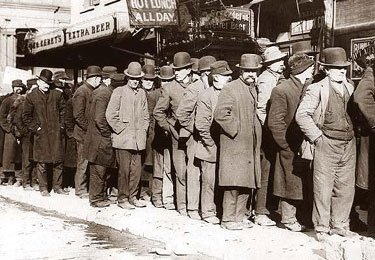Dan Greenfield explains how Progressivism has changed the fundamental nature of American society.
There are two types of societies, production societies and rationing societies. The production society is concerned with taking more territory, exploiting that territory to the best of its ability and then discovering new techniques for producing even more. The rationing society is concerned with consolidating control over all existing resources and rationing them out to the people.
The production society values innovation because it is the only means of sustaining its forward momentum. If the production society ceases to be innovative, it will collapse and default to a rationing society. The rationing society however is threatened by innovation because innovation threatens its control over production.
Socialist or capitalist monopolies lead to rationing societies where production is restrained and innovation is discouraged. The difference between the two is that a capitalist monopoly can be overcome. A socialist monopoly however is insurmountable because it carries with it the full weight of the authorities and the ideology that is inculcated into every man, woman and child in the country.
We have become a rationing society. Our industries and our people are literally starving in the midst of plenty. Farmers are kept from farming, factories are kept from producing and businessmen are kept from creating new companies and jobs. This is done in the name of a variety of moral arguments, ranging from caring for the less fortunate to saving the planet. But rhetoric is only the lubricant of power. The real goal of power is always power. Consolidating production allows for total control through the moral argument of rationing, whether through resource redistribution or cap and trade.
The politicians of a rationing society may blather on endlessly about increasing production, but it’s so much noise, whether it’s a Soviet Five Year Plan or an Obama State of the Union Address. When they talk about innovation and production, what they mean is the planned production and innovation that they have decided should happen on their schedule. And that never works.
You can ration production, but that’s just another word for poverty. You can’t ration innovation, which is why the aggressive attempts to put low mileage cars on the road have failed. As the Soviet Union discovered, you can have rationing or innovation, but you can’t have both at the same time. The total control exerted by a monolithic entity, whether governmental or commercial, does not mix well with innovation.
The rationing society is a poverty generator because not only does it discourage growth, its rationing mechanisms impoverish existing production with massive overhead. The process of rationing existing production requires a bureaucracy for planning, collecting and distributing that production that begins at a ratio of the production and then increases without regard to the limitations of that production.
Read the whole thing.






SDD
Exhibit A: The current attempts by government all over the world to prevent Uber from ruining the rationing model of taxicab medallions.
Exhibit B: The Seattle city government is in the process of spending a billion dollars to create a department of wage regulation that will be needed to enforce their new $15 minimum wage, under which jobs are rationed to people whose labor value is at least $15/hour. Those whose labor value might be less than that are banned from working in Seattle.
Please Leave a Comment!